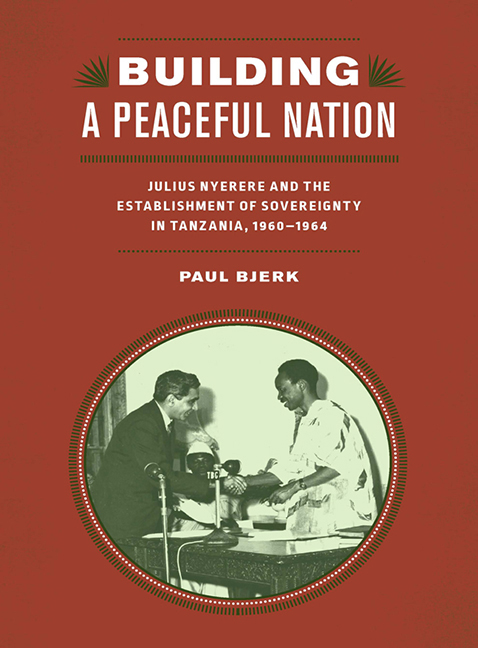 Building a Peaceful Nation
Building a Peaceful Nation 3 - Independence and the Fear of Division
Published online by Cambridge University Press: 08 May 2021
Summary
As they took the reins of independent government in Tanganyika, Nyerere and his colleagues feared that the divisive politics of the opposition would undermine the establishment of a peaceful nation. Although their fears bore some justification in the racialist tone of TANU's opponents, there was no existential threat to the government at independence as there had been in the Congo. Instead, the TANU-led government preemptively tried to dictate the ideological limitations of politics within the new nation by using selective political repression. TANU thereby sought to define the character of sovereignty in the new nation as nonracial.
With preparations for independence celebrations firmly under way, Nyerere's frustrations with the restive labor movement and the racialist views of its leaders poured out in speech after speech and pushed him toward tighter control of political opposition. He intimated a fear that foreigners were trying to manipulate the labor movement; he implied that the labor leadership would lead to dictatorship and that TANU represented the real democratic choice. With fears of instability uppermost in the minds of TANU's leadership, independence inaugurated a new state that valued security over democracy. Somewhat hypocritically, Nyerere justified TANU's suppression of the opposition by goading the voters to choose another party if they wished: “I am telling you, let not anyone get hexed even a little to threaten this government. Once we are governing ourselves we don't want another person to come and start a dictatorship here. We don't rule by dictatorship. If we are no good, then choose another and we’ll see.”
Comparing the colonial state to an animal brought down by a group of hunters, Nyerere displayed a knack for the earthy metaphor that animated rural speech. He lambasted labor leaders for encouraging strikes in protest of the slow pace of Africanization in government offices in the months just before independence. He alleged that labor's ongoing mobilization arose from a purely selfish ambition for power on the part of young leaders who neither understood nor respected the achievement that independence represented and the grave responsibilities of governance.
Let me explain to you the state of the country under a Prime Minister. I didn't go to school until I was older. After raising goats and sheep and hunting I realized that there is a certain pattern.
- Type
- Chapter
- Information
- Building a Peaceful NationJulius Nyerere and the Establishment of Sovereignty in Tanzania, 1960–1964, pp. 61 - 96Publisher: Boydell & BrewerPrint publication year: 2015


